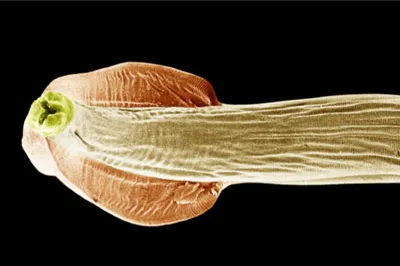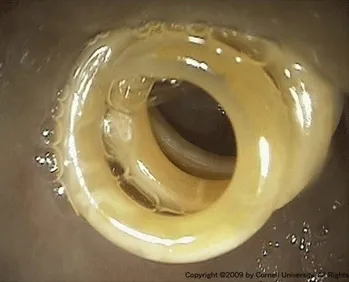Roundworms are among the most prevalent internal parasites found in dogs, affecting nearly all canines at some point in their lives, especially during puppyhood. These common intestinal worms can be contracted in various ways, making them highly transmissible and challenging to control. Beyond affecting our beloved pets, a critical concern for every dog owner is the potential for these parasites to spread to humans. So, Can Roundworms Pass From Dog To Human? The answer is a definitive yes, and understanding this zoonotic risk is vital for protecting both your canine companion and your family.
 Close-up image of a Toxocara canis roundworm, a common intestinal parasite in dogs
Close-up image of a Toxocara canis roundworm, a common intestinal parasite in dogs
What Are Roundworms in Dogs?
Roundworms, primarily Toxocara canis in dogs, are spaghetti-like parasites that reside in the small intestines. Adult worms can grow several inches long and feed on the intestinal contents, depriving the dog of essential nutrients. While they are a common issue for puppies, adult dogs can also become infected. The life cycle of roundworms is complex, involving several stages both within and outside the host, contributing to their widespread nature.
How Do Dogs Contract Roundworms?
Dogs can become infected with roundworms through multiple pathways, highlighting the need for comprehensive prevention.
- Prenatal Transmission: This is one of the most common ways puppies acquire roundworms. If a pregnant mother dog has dormant roundworm larvae in her tissues, these larvae can activate during pregnancy and cross the placenta to infect the unborn puppies. This means puppies can be born with roundworms already present.
- Transmammary Transmission: Puppies can also ingest roundworm larvae through their mother’s milk after birth. Larvae that migrate to the mammary glands can be passed directly to nursing puppies.
- Ingestion of Infective Eggs from the Environment: Dogs, especially puppies, can become infected by ingesting microscopic embryonated eggs from contaminated soil, grass, or feces. These eggs are incredibly hardy and can survive in the environment for years.
- Eating Infected Prey: Dogs, particularly those with a hunting instinct, can contract roundworms by eating small mammals like mice or other rodents that act as “transport hosts” carrying roundworm larvae in their tissues.
Recognizing Roundworm Symptoms in Dogs
Many dogs, especially adults with minor infections, may not show any noticeable signs of roundworms. However, in cases of significant infestation, particularly in puppies, symptoms can be quite apparent and severe. Common signs include:
- Diarrhea: Often soft stools, which can sometimes appear with worms in dog stool that looks like rice. For more information on how parasites can affect bowel movements, you can read about whether can worms cause loose stools in dogs.
- Vomiting: Infected dogs may vomit, and adult roundworms can sometimes be seen in the vomit. These worms are typically white or light brown and several inches long.
- Weight Loss: Despite a normal appetite, dogs may lose weight or fail to thrive due to nutrient deprivation.
- Dull Coat: A poor coat condition is often a sign of underlying health issues, including parasitic infections.
- Pot-Bellied Appearance: This is a classic symptom in puppies, where their abdomen appears distended due to the presence of numerous worms and gas.
- Coughing: If roundworm larvae migrate through the lungs as part of their life cycle, dogs may develop a cough.
Veterinarians diagnose roundworms through a fecal (stool) examination. A small sample of feces is analyzed under a microscope to identify roundworm eggs, confirming the infection.
Preventing Roundworm Infections in Your Canine Companion
Given the various ways dogs can contract roundworms, a multi-faceted approach to prevention is essential.
- Maintain a Clean Environment: Regularly clean your dog’s living areas, especially where they eat and relieve themselves. Promptly remove and dispose of dog feces, as roundworm eggs become infective after a few days in the environment.
- Deworming Protocols for Puppies: Puppies are highly susceptible and should be dewormed at 2, 4, 6, and 8 weeks of age. Following this initial series, a monthly preventive treatment is often recommended.
- Regular Fecal Examinations: Conduct fecal examinations 2 to 4 times during your dog’s first year and 1 to 2 times annually for adult dogs. This helps catch infections early.
- Deworming Nursing Mothers: Nursing mother dogs should be kept on a monthly preventive deworming regimen and treated alongside their puppies to minimize the risk of transmission.
- Prevent Ingestion of Wild Animals: Discourage your dog from hunting or eating wild animals like mice, which can harbor roundworm larvae.
Many heartworm preventives also offer protection against roundworms and other intestinal parasites. Consult your veterinarian to discuss the best prevention and treatment options tailored to your dog’s specific needs and lifestyle.
 Illustration of numerous roundworms (ascarids) present within a dog's intestine
Illustration of numerous roundworms (ascarids) present within a dog's intestine
The Crucial Question: Can Roundworms Pass from Dogs to Humans?
Yes, can roundworms pass from dog to human is a significant public health concern. Humans can indeed become infected with dog roundworms, primarily Toxocara canis, a condition known as Toxocariasis. This is a zoonotic disease, meaning it can be transmitted from animals to humans. While dogs are also susceptible to other parasitic concerns, such as knowing if can humans get heart worms from dogs, roundworm transmission poses a more direct and common threat through environmental contamination.
Human infection typically occurs when an individual accidentally ingests infective roundworm eggs from contaminated soil or dog feces. These eggs are incredibly resilient and can remain viable in the environment for extended periods. Once ingested, the larvae hatch in the human intestine and migrate through various organs, rather than developing into adult worms. This larval migration can lead to two main forms of disease:
- Visceral Larva Migrans (VLM): The larvae travel through internal organs such as the liver, lungs, and central nervous system. Symptoms can include fever, cough, asthma, enlarged liver, and abdominal pain. In severe cases, particularly if larvae reach the brain, neurological signs can occur.
- Ocular Larva Migrans (OLM): Larvae migrate to the eye, causing inflammation and vision loss. This can lead to permanent damage, including blindness in the affected eye, and is often misdiagnosed as other eye conditions.
Children are at a particularly high risk because they often play in soil, sandboxes, and other outdoor environments where contaminated dog feces may be present, and they are more likely to put their hands in their mouths.
Protecting Your Family: Preventing Human Roundworm Infection
Preventing human infection with roundworms involves diligent hygiene and responsible pet ownership:
- Prompt Feces Removal: Always pick up and dispose of dog feces immediately, especially in public areas, parks, and your own backyard. This prevents eggs from contaminating the soil.
- Hand Hygiene: Wash hands thoroughly with soap and water after handling pets, playing outdoors, gardening, or cleaning up pet waste.
- Supervise Children: Do not allow children to play in areas where animals have defecated. Cover sandboxes when not in use to prevent pets from using them as litter boxes.
- Wear Gloves: Individuals who have direct contact with soil potentially contaminated by dog feces (e.g., gardeners) should wear gloves.
- Regular Pet Deworming: Ensure your dog receives regular deworming treatments as recommended by your veterinarian. This significantly reduces the shedding of infective eggs into the environment.
- Educate Children: Teach children about the importance of not eating dirt and washing their hands, especially after playing outside.
While the concern of whether can you catch head lice from dogs might also arise, it’s important to remember that parasites like roundworms, which affect internal systems, require different preventive approaches than external parasites.
When to Seek Veterinary or Medical Attention
If your dog exhibits any symptoms of roundworm infection, contact your veterinarian promptly for diagnosis and treatment. For humans, if you or a family member, especially a child, experiences unexplained symptoms like persistent cough, fever, abdominal pain, or vision changes after potential exposure to contaminated soil or pet feces, consult a medical doctor and inform them of your pet ownership and potential exposure to pet parasites. Early diagnosis and treatment are crucial for better outcomes.
Conclusion
Understanding the question, can roundworms pass from dog to human, is fundamental for responsible pet ownership. While roundworms are a common challenge for dogs, particularly puppies, the good news is that with proper veterinary care, diligent hygiene, and responsible environmental practices, the risks to both your dog and your family can be significantly minimized. Regular deworming, prompt waste disposal, and good hand hygiene are your best defenses against this widespread parasite. Stay informed, stay vigilant, and work closely with your veterinarian to keep your furry friend and your household healthy and safe.
For veterinary professionals, more detailed information on roundworms can be found at https://www.capcvet.org/guidelines/ascarid/.
